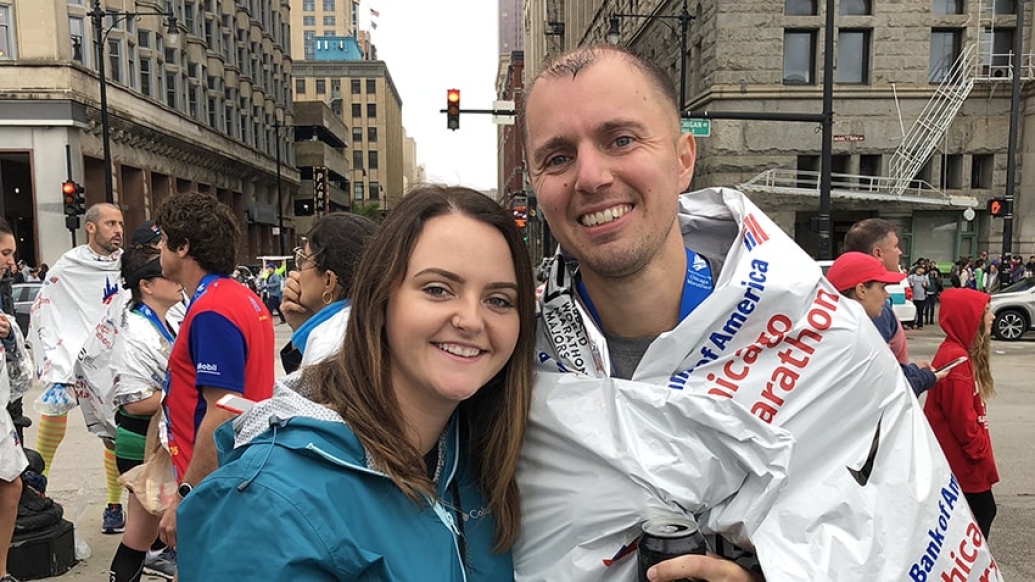Justin Kurtz has endured surgery and chemotherapy treatment for a rare brain tumor, but it hasn’t stopped him from tackling other big challenges.
7:00 AM
Author |

Life takes surprising turns and throws unexpected curveballs.
No one knows this better than Justin Kurtz.
In less than two years, the 30-year-old accepted his dream job flying for Delta Air Lines, was diagnosed with a malignant brain tumor and even ran his first marathon while undergoing chemotherapy.
LISTEN UP: Add the new Michigan Medicine News Break to your Alexa-enabled device, or subscribe to our daily audio updates on iTunes, Google Play and Stitcher.
A positive attitude and strong conviction have fueled the young pilot's achievements and battles, most notably against a rare malignant brain tumor known as anaplastic astrocytoma.
Anaplastic astrocytomas can develop in the brain or spinal cord. In adults, they occur most often in the cerebrum (the largest part of the brain) and grow slowly.
Symptoms vary depending on the location and size of the tumor. The cause is unknown.
Unexpected brain tumor diagnosis
Kurtz's tumor, located on the left side of his brain, was discovered without warning.
MORE FROM MICHIGAN: Sign up for our weekly newsletter
A few months into his job with Delta in the summer of 2017, Kurtz piloted the red-eye from Los Angeles to Cincinnati and then caught a quick flight to Detroit. Despite having been awake for much of the night and feeling exhausted, he began his 30-minute drive to his home at the time in Wyandotte, Michigan.
He never made it.
Kurtz fell asleep while stopped at a traffic light and was soon awakened by an emergency medical technician who knocked on his car window. He was startled and confused by the exchange.
When the EMT suggested taking him to a hospital to be examined, Kurtz agreed.
"I wanted to make sure there were no drug allegations that could damage my career as a pilot," Kurtz says.
No signs of a brain tumor
Doctors found no signs of drug use. Instead, a 4.5 cm mass was discovered deep in his brain, near an area essential for vision.
The diagnosis shocked Kurtz, who experienced no symptoms of a brain tumor. "I had just learned all-new flight procedures for a brand-new airline and was able to keep up," he says.
There were also no indications that the brain tumor was affecting his coordination, a common symptom of anaplastic astrocytomas. Other symptoms include headache, drowsiness, vomiting and changes in personality and mental status. Some people also report seizures and vision problems.
"It was a slow-growing tumor, and my brain was able to adjust," speculates Kurtz, who was referred to Michigan Medicine for surgery.
We used all available resources . . . to achieve the best possible surgical result.Daniel Orringer, M.D.
'The stakes couldn't be higher'
On Oct. 12, 2017, Michigan Medicine neurosurgeon Daniel Orringer, M.D., performed a 12-hour operation to remove Kurtz's tumor.
"Operating on a tumor near areas essential for vision and memory in a pilot is a unique challenge," Orringer says. "The stakes couldn't be higher
"We used all available resources, including advanced preoperative imaging, neuropsychological testing, intraoperative MRI and stimulated Raman histology to achieve the best possible surgical result."
SEE ALSO: Removing a Teen's Baseball-Sized Tumor a Team Effort
Stimulated Raman histology was first executed by neurosurgeons and pathologists at Michigan Medicine as a method of visualizing microscopic features of affected tissue and making a diagnosis during surgery.
This eliminates the lengthy process of sending tissue to the pathology lab for processing and interpretation.
A few days after surgery, Kurtz left the hospital and began six weeks of radiation combined with daily chemotherapy. He's now on a chemo regimen of five days on and 23 days off.
Life after a brain tumor
Despite experiencing nausea and fatigue, which he manages with medication, Kurtz hasn't slowed down.
Doctors monitor his condition every few months with MRIs and remain hopeful.
"He had a good resection," says Michigan Medicine neuro-oncologist Yoshie Umemura, M.D. "He went through chemo-radiation and now chemo because of his high-grade tumor. He has tolerated it well and has stayed very positive."
The goal, Umemura says, "is to slow down the progression of the tumor for as long as we can. He's a very encouraging person. His age and overall health help with the prognosis."

Lofty goals achieved
Kurtz hasn't returned to the pilot's seat, but he is keeping busy. He is working in Atlanta as a simulation instructor with Delta and remains optimistic about flying again.
And he recently surprised even himself by running 26.2 miles in the Bank of America Chicago Marathon. The event took place on his birthday, Oct. 7 — just days after completing a round of chemo.
SEE ALSO: Positivity and Family Inspire Post-Brain Tumor Recovery
"I had never run a marathon but was inspired by my uncle and mentor, who is also a pilot," says Kurtz, and he plans to continue the pursuit. "Running makes me feel better."
He also feels confident about the path he's taking to fight his cancer, and the Michigan Medicine team providing specialized care.
"Just like people rely on me as a pilot to decide flight plans, I rely on my doctors," Kurtz says. "They're the experts."

Explore a variety of health care news & stories by visiting the Health Lab home page for more articles.

Department of Communication at Michigan Medicine
Want top health & research news weekly? Sign up for Health Lab’s newsletters today!





